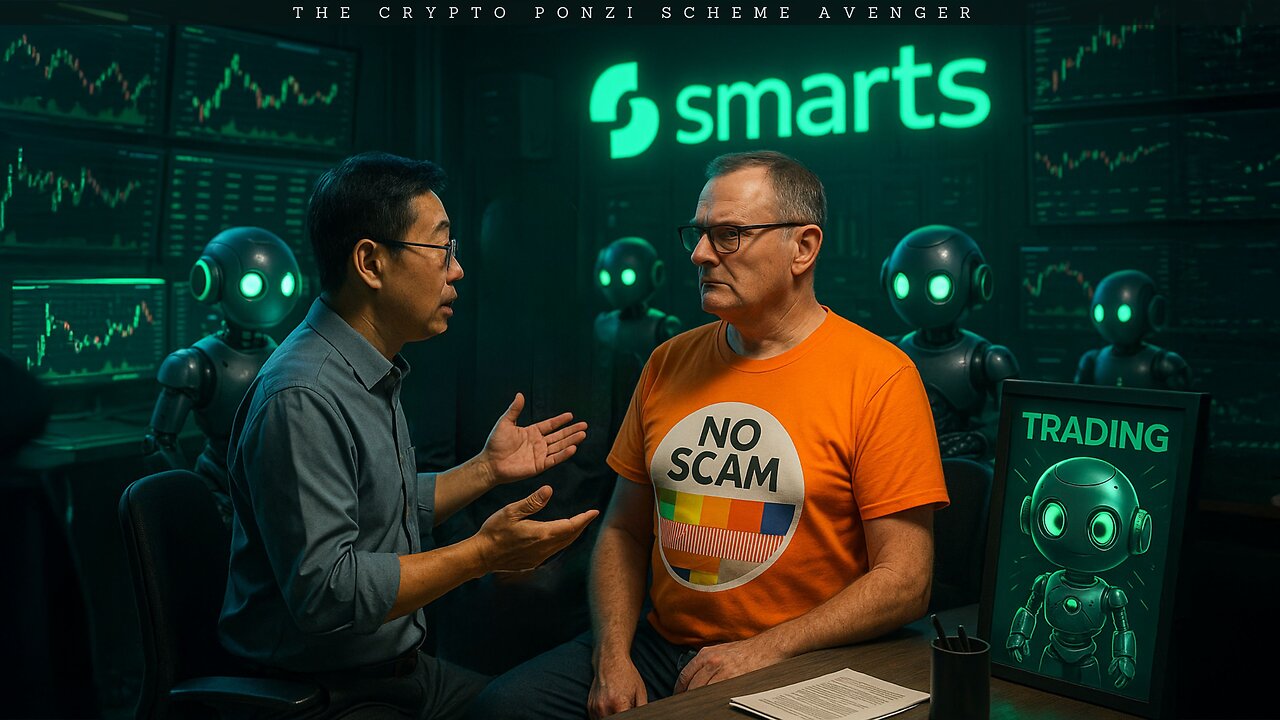Premium Only Content

SMARTS.MONEY – The “Zero-Loss” Fantasy Disguised as AI Trading
Every scam starts the same way: someone thinks they’ve found the secret the banks don’t want you to know.
In this case, that someone was my Keen Recruiter — a man now identified as Winton B Morgan — an over-excited salesman who insisted SMARTS.MONEY was “the next Hyperverse — but real this time.”
He first contacted me via text from +1 (256) 924-2181, addressing me as “Sir” every second line and promising 50 percent ROI in 60 days. The pitch was short, punchy, and familiar: “No long staking, no emotion, full transparency.” He even threw in a Zoom Link and dared me to “prove him wrong.”
So I did exactly that.
How the Rabbit Hole Opened
Keen Recruiter
Winton B Morgan
My Keen Recruiter appeared to be connected to a supposed marketing outfit called MEGA Mobile Marketing — a self-described AI and web-design agency listing a non-existent office at 2001 Duncan Drive Suite 2872 and operating under two phone numbers: +1 (256) 701-1711 and +1 (256) 924-2181.
Their Facebook page has zero followers and looks like a placeholder, filled with generic buzzwords about AI, software, and business technology but no genuine company activity. The page lists the contact email [email protected], which still bounces automated replies — another clear sign of a ghost operation.
When I checked the number +1 (256) 701-1711 on WhatsApp, a profile appeared under the name Winton B Morgan, complete with a profile image. A reverse-image search of that photo turned up no matches anywhere else online. While that doesn’t prove the image is original, it does show it’s not a recycled stock photo or one of the common AI-generated faces that appear across multiple scam networks. Given the image’s realism — combined with the fact that the same number later attempted to call me — it’s highly likely this is the real person behind the recruitment push, not just another anonymous avatar.
When I tried messaging the number, there was no reply — but moments later, I received a call attempt from the same line, a classic sign of someone caught off guard. It left me with two possibilities: either someone was trying to bait me, or I’d accidentally uncovered the genuine recruiter behind the SMARTS.MONEY promotion.
Whatever the truth, one fact is undeniable — MEGA Mobile Marketing operates as a recruitment funnel for an unregistered investment scheme, cloaked in slick “AI business” jargon. And the story only gets worse once you step inside SMARTS itself.
What SMARTS Pretends to Be
Their SMARTS Docs knowledge base describes itself as an AI-powered MEV trading platform built on Solana and Binance Smart Chain. It claims to scan the mempool for profitable “sandwich trades” — the same high-frequency tactics used by professional arbitrage bots — and promises to execute them “only when 100 percent profitable.”
Their founder, supposedly a developer named “Prakash Mea,” told a webinar audience:
“The bot cannot lose money in execution. If no profitable opportunity is detected, it simply skips the transaction and moves instantly to the next one.”
That sentence alone disqualifies SMARTS from being legitimate.
Every trading algorithm on Earth carries risk. Even high-frequency arbitrageurs lose when liquidity, latency, or gas fees shift. Claiming “zero-loss execution” is mathematically impossible.
Their promotional videos use AI-generated voices, not real presenters. The “live demos” always show the same phantom wallets magically gaining a few tenths of a SOL or BNB token — no audit, no verifiable smart-contract code, no external validation. The supposed proof of profit is nothing more than a screen capture of a wallet balance edited to rise on cue.
The Referral Hook
By mid-2025, SMARTS had already launched its “Rewards Program”:
Activate the bot for $49.90 USD, refer a friend, and earn $40 USD per activation. That’s an 80 percent payout — unsustainable unless new buyers continually feed the system.
They later expanded this into a 20-level referral tree, removing any personal-deposit requirement to “unlock tiers.” It’s a textbook MLM structure disguised as fintech. The company’s August update even bragged that they were focusing recruitment on “grassroots builders in Southeast Asia, the Middle East, and Europe.” That’s not trading expansion; that’s multi-level scaling.
The Technical Illusion
SMARTS throws around genuine blockchain terms — mempool, RPC nodes, sandwiching, atomic arbitrage — but never provides verifiable code or an audit trail.
Here’s what’s wrong technically:
No verifiable smart contract: there is no public repository or contract address that independent analysts can review. Real MEV bots are open-source or at least provably on-chain. SMARTS hides behind a private interface that only works after you pay the activation fee.
Impossible execution claims: sandwich attacks require block-producer access or extremely low latency. Retail users connecting through a browser wallet cannot outrun professional MEV bots. SMARTS’s claim that ordinary users can profit “automatically” on Solana or BSC contradicts how those networks function.
Demonstration wallets: the wallets shown in videos are isolated demonstration accounts. They don’t match any live, profit-making contract on SolanaScan or BscScan. The “profits” are likely preloaded funds moved between internal addresses to look active.
No proof of AI: every mention of “machine learning” is marketing fluff. There is no description of model architecture, data source, or inference process — just buzzwords like “predictive intelligence” and “adaptive algorithms.”
No legitimate business entity: the Terms of Use and Privacy Policy contain zero corporate identification, registration number, or governing jurisdiction. That means there is no company — just a website.
The Legal Facade
SMARTS’s legal documents are long, polished, and empty. They read like they were copied from a legitimate broker’s compliance page and scrubbed of anything traceable.
The Privacy Policy claims to collect government-issued ID, IP logs, wallet addresses, and payment details “for KYC compliance.” But since there is no registered company, any ID upload simply hands personal data to anonymous operators.
The Terms of Use disclaim all responsibility, stating:
“We do not guarantee profits or success. You may lose all or part of your investment.”
and
“SMARTS shall not be held liable for any failure or delay in performance caused by circumstances beyond its reasonable control.”
They even reserve the right to change terms at any time and require users to indemnify SMARTS for any legal disputes. In other words, you agree that they can keep your money, rewrite the rules, and charge you for their legal fees if you complain.
This is not legal compliance — it’s a liability shield.
The Math Doesn’t Work
The “Global Connect” event in their videos boasted 20,000 users, 700,000 transactions, and an average 1.25 percent daily return — supposedly generating $6.9 million in community profit.
If that were real, it would rank SMARTS among the top DeFi protocols on Solana by volume. Yet there is no trace of SMARTS on any blockchain analytics platform. No GitHub, no whitepaper, no contract audit, no mention on DefiLlama, DappRadar, or CoinMarketCap.
The numbers exist only inside SMARTS’s promotional videos and scripts.
The Illusion of Proof – SMARTS’s Fake YouTube Channel
If you need one more reason to doubt SMARTS, look no further than their official YouTube channel, @smarts-ai, which claims to feature “engineers,” “founders,” and “strategy leads” explaining how the MEV bot works.
Not one of them is real. Every voice is AI-generated, every conversation scripted, and every “interview” stitched together with stock footage and text-to-speech narration. Their so-called “Global Connect Event” — presented as a live community gathering — is nothing more than a montage of prerecorded clips with AI voices pretending to be company executives.
They use these videos to simulate credibility, to make viewers feel they’re watching a legitimate fintech startup rather than a recruitment-driven Ponzi. It’s a deliberate psychological tactic: fake authority through fake people.
SMARTS doesn’t have a team — it has a voice library.
Real-World Red Flags
1. Anonymous Team – “Prakash Mea,” “Zoe,” and “Brandon” have no digital footprint prior to SMARTS. All voices appear synthetic, likely AI-generated.
2. Non-traceable Address – “2001 Duncan Drive Suite 2872” doesn’t correspond to any registered office.
3. Domain Age – smarts.money was registered in early 2025, months before the so-called “years of development.”
4. Over-production, under-proof – Dozens of short tutorial videos, none showing genuine blockchain transactions.
5. Referral Commissions Outweigh Revenue – $40 payouts on $49.90 sales prove the product isn’t the bot, it’s the recruit.
6. Fake Community Testimonials – AI voices and staged “leaders” claiming instant withdrawals.
7. Absence of Legal Entity – No company, no registration, no jurisdiction = no accountability.
Every one of these is a flashing siren.
The Psychology of the Pitch
SMARTS follows a precise psychological formula used by modern crypto MLMs:
Promise sophistication, deliver simplicity; promise automation, deliver dependence.
They tell users that trading manually is emotional and risky — that their AI can eliminate human error. The real purpose is to make participants feel safe enough to hand over crypto and recruit friends. By the time users realise the profits are fabricated, their referrals have already multiplied the pot.
The Real Risk
Anyone considering “having a go” with SMARTS is stepping into a casino with a rigged table.
Once your crypto leaves your wallet, it enters a contract or central address controlled entirely by the operators. You will never see an independent audit, and any withdrawal you manage early on will be bait for your next deposit.
More dangerous still, by submitting KYC documents you may expose your identity to the very people running the scam. Those details can later be used to open accounts, create new domains, or impersonate you when SMARTS inevitably rebrands.
Why It Feels Convincing
SMARTS’s strength lies in presentation. The fake professionalism — webinars, subtitles, detailed “roadmaps” — gives the illusion of legitimacy. They use buzzwords that make retail investors feel like insiders:
“On-chain arbitrage… zero-loss logic… AI predictive models… atomic execution.”
It sounds technical enough to silence doubt. That’s the entire point.
The Truth Beneath the Gloss
SMARTS is not a trading platform. It is a recruitment-driven funnel wrapped in AI marketing. It borrows DeFi terminology, disguises referral bonuses as “community rewards,” and hides behind untraceable entities.
The system survives only as long as new users pay activation fees and hand over crypto for “bot funding.” Once deposits slow, the operators will pivot — probably to a new domain promising “Smarter MEV v2.”
The only thing “zero-loss” about this project is the accountability of its founders.
Final Thoughts
If you’ve already joined, withdraw whatever you can. Take screenshots of every page, every payment address, and every message from recruiters like those at MEGA Mobile Marketing.
If you’re thinking of joining, remember this:
“The bot only executes when conditions are 100 percent in its favour.”
The people behind SMARTS are operating under that same principle — they only act when the conditions guarantee their profit, not yours.
Treat SMARTS.MONEY exactly as you would treat any online casino. The difference is that in a casino, the odds are printed on the table. Here, they’re hidden in code you’ll never see.
Disclaimer: How This Investigation Was Conducted
This investigation relies entirely on OSINT — Open Source Intelligence — meaning every claim made here is based on publicly available records, archived web pages, corporate filings, domain data, social media activity, and open blockchain transactions. No private data, hacking, or unlawful access methods were used. OSINT is a powerful and ethical tool for exposing scams without violating privacy laws or overstepping legal boundaries.
About the Author
Danny de Hek, also known as The Crypto Ponzi Scheme Avenger, is a New Zealand-based investigative journalist specializing in exposing crypto fraud, Ponzi schemes, and MLM scams. His work has been featured by Bloomberg, The New York Times, The Guardian Australia, ABC News Australia, and other international outlets.
Stop losing your future to financial parasites. Subscribe. Expose. Protect.
My work exposing crypto fraud has been featured in:
Bloomberg Documentary (2025): A 20-minute exposé on Ponzi schemes and crypto card fraud
News.com.au (2025): Profiled as one of the leading scam-busters in Australasia
OpIndia (2025): Cited for uncovering Pakistani software houses linked to drug trafficking, visa scams, and global financial fraud
The Press / Stuff.co.nz (2023): Successfully defeated $3.85M gag lawsuit; court ruled it was a vexatious attempt to silence whistleblowing
The Guardian Australia (2023): National warning on crypto MLMs affecting Aussie families
ABC News Australia (2023): Investigation into Blockchain Global and its collapse
The New York Times (2022): A full two-page feature on dismantling HyperVerse and its global network
Radio New Zealand (2022): “The Kiwi YouTuber Taking Down Crypto Scammers From His Christchurch Home”
Otago Daily Times (2022): A profile on my investigative work and the impact of crypto fraud in New Zealand
-
 53:58
53:58
THE CRYPTO PONZI SCHEME AVENGER
12 days agoDanny vs Goliath: New Zealand Journalist Sued by Christopher Delgado’s GOLIATH VENTURES INC
64 -
 12:29
12:29
Clintonjaws
11 hours ago $5.58 earnedShane Gillis vs 'The View' - This Is Priceless!
10.5K5 -
 22:53
22:53
Jasmin Laine
17 hours agoCarney’s Speech BACKFIRES Spectacularly—Liberals PANIC on National TV
10.7K21 -
 1:38
1:38
Jeff Ahern
11 hours ago $0.99 earnedThe Mamdani Effect
10.2K1 -
 LIVE
LIVE
The Bubba Army
22 hours agoNBA BETTING SCANDAL! - Bubba the Love Sponge® Show | 10/24/25
812 watching -
 8:01
8:01
The Gun Collective
14 hours agoBEST new 2011 in 2025? -- Kimber 2K11 Pro Honest Review!
16.3K2 -
 8:49
8:49
Millionaire Mentor
17 hours agoMAGA Vet SHUTS DOWN AOC So Hard She LOST IT
14.7K24 -
 7:25
7:25
The Shannon Joy Show
17 hours agoWhat is the PRIME Act? With Rep. Thomas Massie
16.2K5 -
 24:17
24:17
The Official Corbett Report Rumble Channel
13 hours agoGates' Fake Meat Agenda Flops! - #NewWorldNextWeek
11.7K14 -
 34:08
34:08
Simply Bitcoin
1 day ago $1.83 earnedLiving Off Bitcoin: Solar Mining in a Trailer
10K